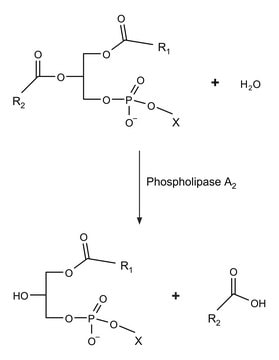1.05691
Lithium hydroxide
98%+, for analysis EMSURE®
Sinónimos:
Lithium hydroxide 98%+
About This Item
Productos recomendados
Nombre del producto
Lithium hydroxide 98%+, for analysis EMSURE®
Quality Level
product line
EMSURE®
assay
≥98.0% (LiOH, acidimetric)
form
solid
potency
210 mg/kg LD50, oral (Rat)
pH
12 (50 °C, 50 g/L in H2O)
mp
423 °C
solubility
110 g/L
density
1.5 g/cm3
bulk density
550 kg/m3
anion traces
chloride (Cl-): ≤0.05%
lithium carbonate (Li2CO3): ≤2.0%
sulfate (SO42-): ≤0.05%
cation traces
Ca: ≤0.02%
Fe: ≤0.002%
K: ≤0.02%
Na: ≤0.05%
heavy metals (as Pb): ≤0.002%
storage temp.
2-30°C
SMILES string
[Li]O
InChI
1S/Li.H2O/h;1H2/q+1;/p-1
InChI key
WMFOQBRAJBCJND-UHFFFAOYSA-M
Application
- A study of the hydration of the alkali metal ions in aqueous solution.: This research explores the hydration properties of alkali metal ions, focusing on lithium ions in aqueous solutions. The study provides insights into the hydration structures and dynamics, which are essential for understanding various chemical processes involving lithium hydroxide (Mähler J, Persson I, 2012) (Mähler and Persson, 2012).
- Determination of markers in digesta and feces by direct current plasma emission spectroscopy.: This paper discusses the use of direct current plasma emission spectroscopy for analyzing markers in biological samples. The method′s applicability for detecting lithium ions among other markers in complex matrices showcases its utility in analytical chemistry and related fields (Combs DK, Satter LD, 1992) (Combs and Satter, 1992).
Analysis Note
Carbonate (as Li₂CO₃): ≤ 2.0 %
Chloride (Cl): ≤ 0.05 %
Sulfate (SO₄): ≤ 0.05 %
Heavy metals (as Pb): ≤ 0.002 %
Ca (Calcium): ≤ 0.02 %
Fe (Iron): ≤ 0.002 %
K (Potassium): ≤ 0.02 %
Na (Sodium): ≤ 0.05 %
Legal Information
signalword
Danger
hcodes
Hazard Classifications
Acute Tox. 4 Oral - Eye Dam. 1 - Skin Corr. 1B
Storage Class
8A - Combustible, corrosive hazardous materials
wgk_germany
WGK 1
flash_point_f
Not applicable
flash_point_c
Not applicable
Certificados de análisis (COA)
Busque Certificados de análisis (COA) introduciendo el número de lote del producto. Los números de lote se encuentran en la etiqueta del producto después de las palabras «Lot» o «Batch»
¿Ya tiene este producto?
Encuentre la documentación para los productos que ha comprado recientemente en la Biblioteca de documentos.
Nuestro equipo de científicos tiene experiencia en todas las áreas de investigación: Ciencias de la vida, Ciencia de los materiales, Síntesis química, Cromatografía, Analítica y muchas otras.
Póngase en contacto con el Servicio técnico




